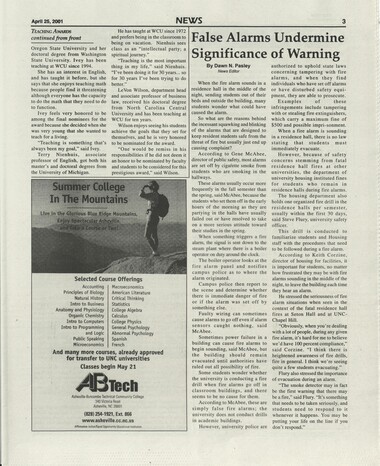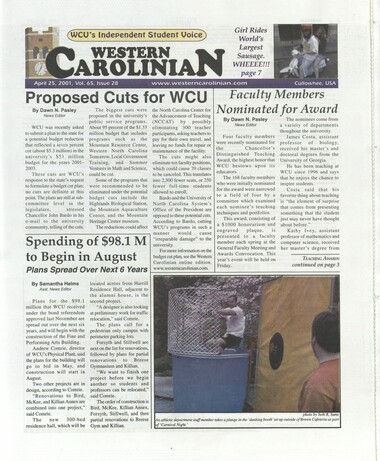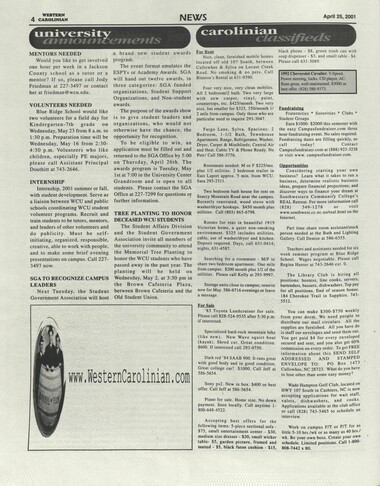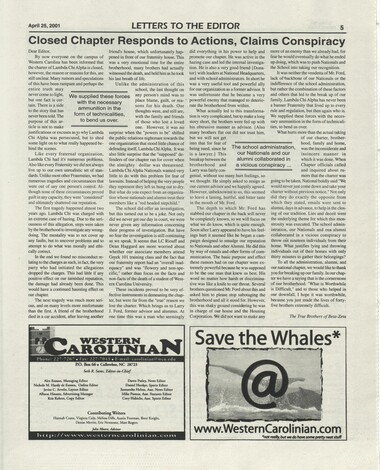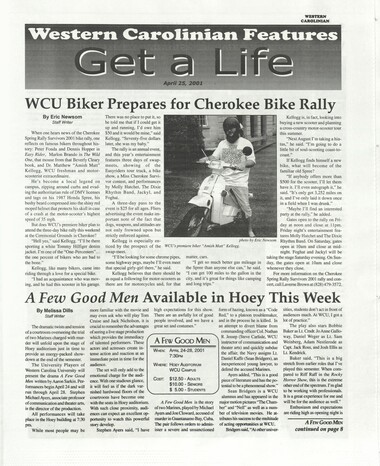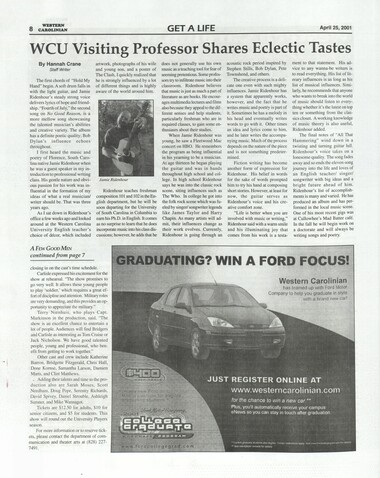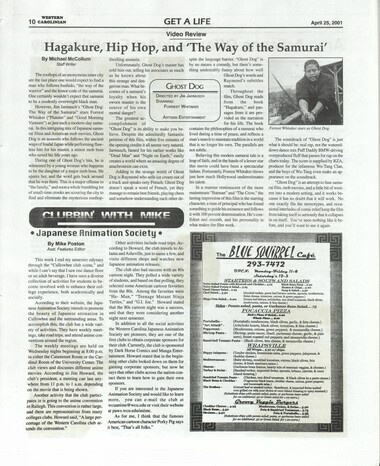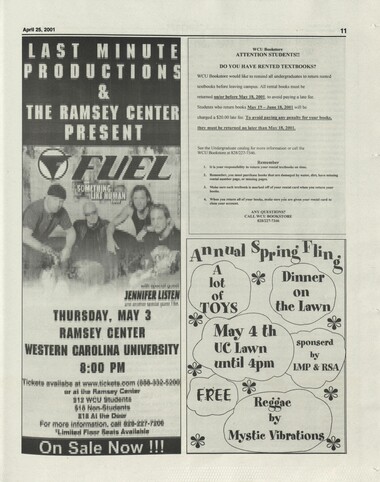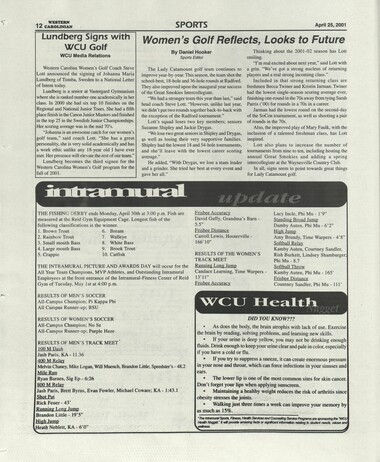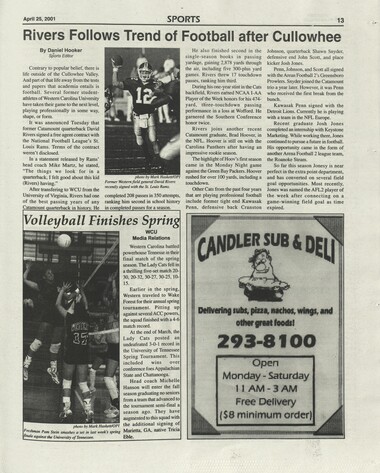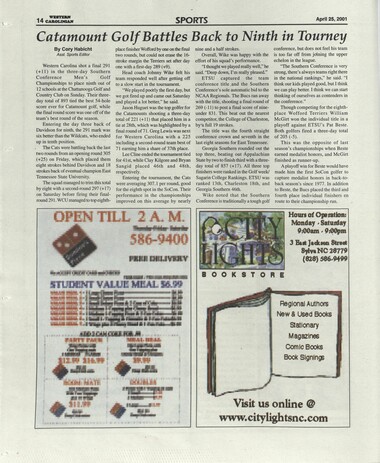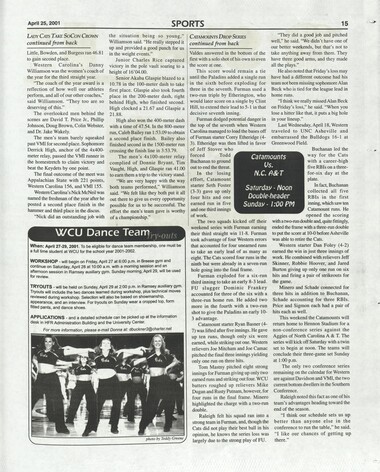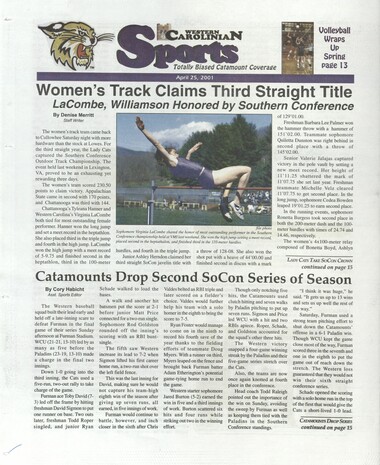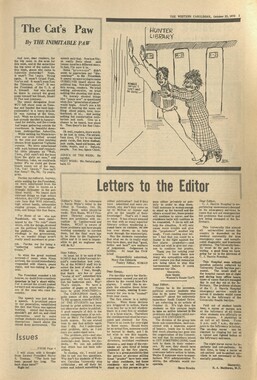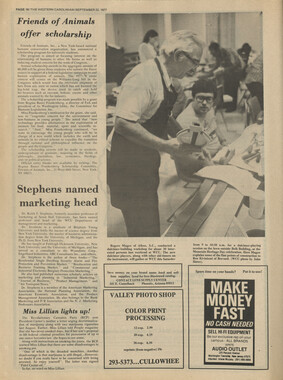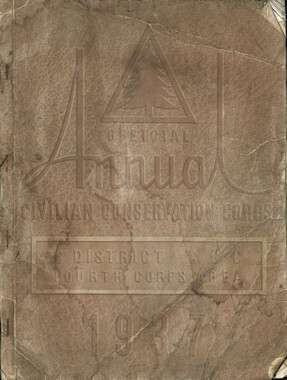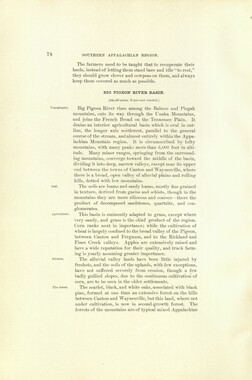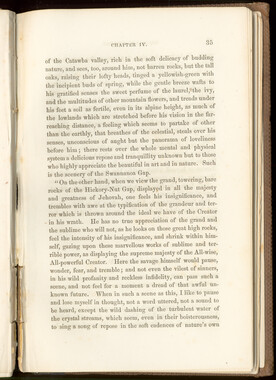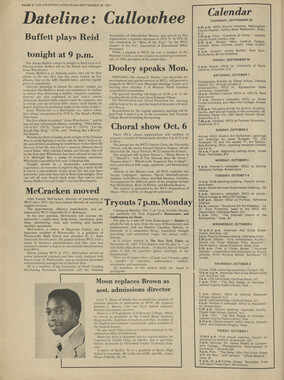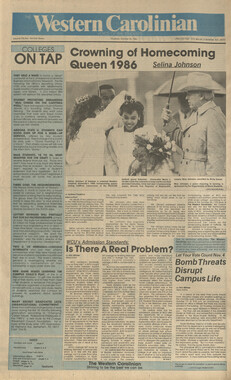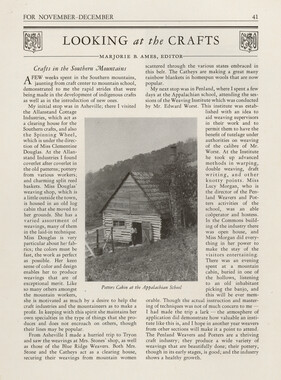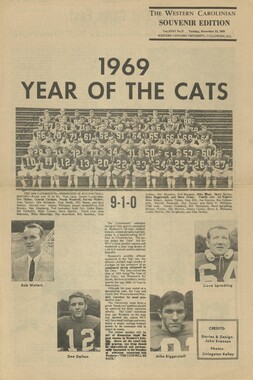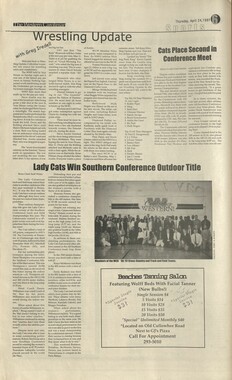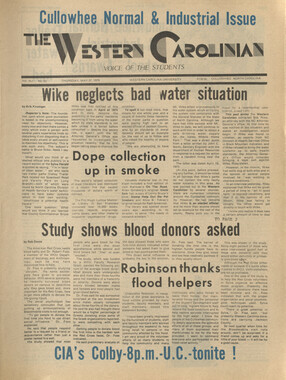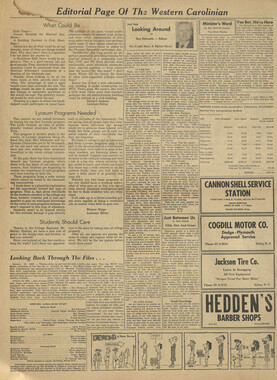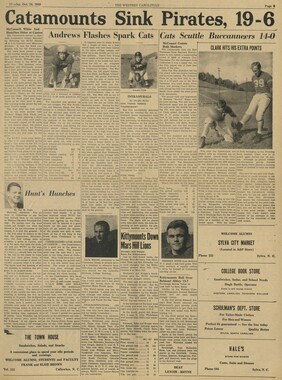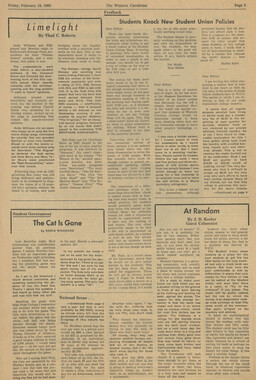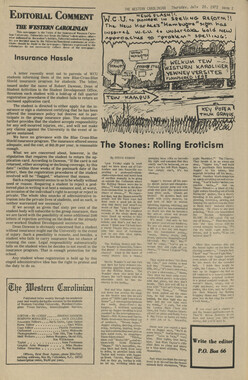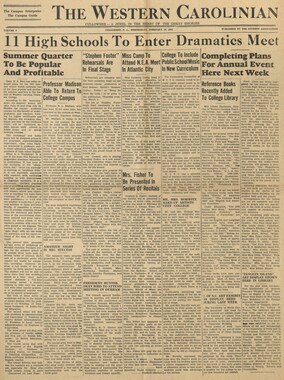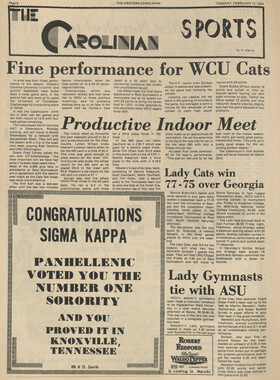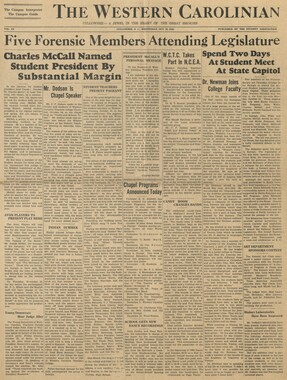Western Carolina University (20)
View all
- Canton Champion Fibre Company (2308)
- Cherokee Traditions (293)
- Civil War in Southern Appalachia (165)
- Craft Revival (1942)
- Great Smoky Mountains - A Park for America (2767)
- Highlights from Western Carolina University (430)
- Horace Kephart (941)
- Journeys Through Jackson (154)
- LGBTQIA+ Archive of Jackson County (24)
- Oral Histories of Western North Carolina (314)
- Picturing Appalachia (6772)
- Stories of Mountain Folk (413)
- Travel Western North Carolina (160)
- Western Carolina University Fine Art Museum Vitreograph Collection (129)
- Western Carolina University Herbarium (92)
- Western Carolina University: Making Memories (708)
- Western Carolina University Publications (2283)
- Western Carolina University Restricted Electronic Theses and Dissertations (146)
- Western North Carolina Regional Maps (71)
- World War II in Southern Appalachia (131)
University of North Carolina Asheville (6)
View all
- Allanstand Cottage Industries (62)
- Appalachian National Park Association (53)
- Bennett, Kelly, 1890-1974 (1388)
- Berry, Walter (76)
- Brasstown Carvers (40)
- Carver, George Washington, 1864?-1943 (26)
- Cathey, Joseph, 1803-1874 (1)
- Champion Fibre Company (233)
- Champion Paper and Fibre Company (297)
- Cherokee Indian Fair Association (16)
- Cherokee Language Program (22)
- Crowe, Amanda (40)
- Edmonston, Thomas Benton, 1842-1907 (7)
- Ensley, A. L. (Abraham Lincoln), 1865-1948 (275)
- Fromer, Irving Rhodes, 1913-1994 (70)
- George Butz (BFS 1907) (46)
- Goodrich, Frances Louisa (120)
- Grant, George Alexander, 1891-1964 (96)
- Heard, Marian Gladys (60)
- Kephart, Calvin, 1883-1969 (15)
- Kephart, Horace, 1862-1931 (313)
- Kephart, Laura, 1862-1954 (39)
- Laney, Gideon Thomas, 1889-1976 (439)
- Masa, George, 1881-1933 (61)
- McElhinney, William Julian, 1896-1953 (44)
- Niggli, Josephina, 1910-1983 (10)
- North Carolina Park Commission (105)
- Osborne, Kezia Stradley (9)
- Owens, Samuel Robert, 1918-1995 (11)
- Penland Weavers and Potters (36)
- Roberts, Vivienne (15)
- Roth, Albert, 1890-1974 (142)
- Schenck, Carl Alwin, 1868-1955 (1)
- Sherrill's Photography Studio (2565)
- Southern Highland Handicraft Guild (127)
- Southern Highlanders, Inc. (71)
- Stalcup, Jesse Bryson (46)
- Stearns, I. K. (213)
- Thompson, James Edward, 1880-1976 (226)
- United States. Indian Arts and Crafts Board (130)
- USFS (683)
- Vance, Zebulon Baird, 1830-1894 (1)
- Weaver, Zebulon, 1872-1948 (58)
- Western Carolina College (230)
- Western Carolina Teachers College (282)
- Western Carolina University (1794)
- Western Carolina University. Mountain Heritage Center (18)
- Whitman, Walt, 1819-1892 (10)
- Wilburn, Hiram Coleman, 1880-1967 (73)
- Williams, Isadora (3)
- Cain, Doreyl Ammons (0)
- Crittenden, Lorraine (0)
- Rhodes, Judy (0)
- Smith, Edward Clark (0)
- Appalachian Region, Southern (2393)
- Asheville (N.C.) (1887)
- Avery County (N.C.) (26)
- Blount County (Tenn.) (161)
- Buncombe County (N.C.) (1664)
- Cherokee County (N.C.) (283)
- Clay County (N.C.) (555)
- Graham County (N.C.) (233)
- Great Smoky Mountains National Park (N.C. and Tenn.) (481)
- Haywood County (N.C.) (3522)
- Henderson County (N.C.) (70)
- Jackson County (N.C.) (4692)
- Knox County (Tenn.) (25)
- Knoxville (Tenn.) (12)
- Lake Santeetlah (N.C.) (10)
- Macon County (N.C.) (420)
- Madison County (N.C.) (211)
- McDowell County (N.C.) (39)
- Mitchell County (N.C.) (132)
- Polk County (N.C.) (35)
- Qualla Boundary (981)
- Rutherford County (N.C.) (76)
- Swain County (N.C.) (2113)
- Transylvania County (N.C.) (247)
- Watauga County (N.C.) (12)
- Waynesville (N.C.) (68)
- Yancey County (N.C.) (72)
- Aerial Photographs (3)
- Aerial Views (60)
- Albums (books) (4)
- Articles (1)
- Artifacts (object Genre) (228)
- Biography (general Genre) (2)
- Cards (information Artifacts) (38)
- Clippings (information Artifacts) (191)
- Crafts (art Genres) (622)
- Depictions (visual Works) (21)
- Design Drawings (1)
- Drawings (visual Works) (184)
- Envelopes (73)
- Facsimiles (reproductions) (1)
- Fiction (general Genre) (4)
- Financial Records (12)
- Fliers (printed Matter) (67)
- Glass Plate Negatives (381)
- Guidebooks (2)
- Internegatives (10)
- Interviews (811)
- Land Surveys (102)
- Letters (correspondence) (1013)
- Manuscripts (documents) (619)
- Maps (documents) (159)
- Memorandums (25)
- Minutes (administrative Records) (59)
- Negatives (photographs) (5835)
- Newsletters (1285)
- Newspapers (2)
- Occupation Currency (1)
- Paintings (visual Works) (1)
- Pen And Ink Drawings (1)
- Periodicals (193)
- Personal Narratives (7)
- Photographs (12975)
- Plans (maps) (1)
- Poetry (6)
- Portraits (1663)
- Postcards (329)
- Programs (documents) (151)
- Publications (documents) (2237)
- Questionnaires (65)
- Scrapbooks (282)
- Sheet Music (1)
- Slides (photographs) (402)
- Sound Recordings (796)
- Specimens (92)
- Speeches (documents) (15)
- Tintypes (photographs) (8)
- Transcripts (322)
- Video Recordings (physical Artifacts) (23)
- Vitreographs (129)
- Text Messages (0)
- A.L. Ensley Collection (275)
- Appalachian Industrial School Records (7)
- Appalachian National Park Association Records (336)
- Axley-Meroney Collection (2)
- Bayard Wootten Photograph Collection (20)
- Bethel Rural Community Organization Collection (7)
- Blumer Collection (5)
- C.W. Slagle Collection (20)
- Canton Area Historical Museum (2110)
- Carlos C. Campbell Collection (282)
- Cataloochee History Project (65)
- Cherokee Studies Collection (4)
- Daisy Dame Photograph Album (5)
- Daniel Boone VI Collection (1)
- Doris Ulmann Photograph Collection (112)
- Elizabeth H. Lasley Collection (1)
- Elizabeth Woolworth Szold Fleharty Collection (4)
- Frank Fry Collection (95)
- George Masa Collection (173)
- Gideon Laney Collection (452)
- Hazel Scarborough Collection (2)
- Hiram C. Wilburn Papers (28)
- Historic Photographs Collection (236)
- Horace Kephart Collection (861)
- Humbard Collection (33)
- Hunter and Weaver Families Collection (1)
- I. D. Blumenthal Collection (4)
- Isadora Williams Collection (4)
- Jesse Bryson Stalcup Collection (47)
- Jim Thompson Collection (224)
- John B. Battle Collection (7)
- John C. Campbell Folk School Records (80)
- John Parris Collection (6)
- Judaculla Rock project (2)
- Kelly Bennett Collection (1407)
- Love Family Papers (11)
- Major Wiley Parris Civil War Letters (3)
- Map Collection (12)
- McFee-Misemer Civil War Letters (34)
- Mountain Heritage Center Collection (4)
- Norburn - Robertson - Thomson Families Collection (44)
- Pauline Hood Collection (7)
- Pre-Guild Collection (2)
- Qualla Arts and Crafts Mutual Collection (12)
- R.A. Romanes Collection (681)
- Rosser H. Taylor Collection (1)
- Samuel Robert Owens Collection (94)
- Sara Madison Collection (144)
- Sherrill Studio Photo Collection (2558)
- Smoky Mountains Hiking Club Collection (616)
- Stories of Mountain Folk - Radio Programs (374)
- The Reporter, Western Carolina University (510)
- Venoy and Elizabeth Reed Collection (16)
- WCU Gender and Sexuality Oral History Project (32)
- WCU Mountain Heritage Center Oral Histories (25)
- WCU Oral History Collection - Mountain People, Mountain Lives (71)
- WCU Students Newspapers Collection (1744)
- Western North Carolina Tomorrow Black Oral History Project (69)
- William Williams Stringfield Collection (2)
- Zebulon Weaver Collection (109)
- African Americans (390)
- Appalachian Trail (35)
- Artisans (521)
- Cherokee art (84)
- Cherokee artists -- North Carolina (10)
- Cherokee language (21)
- Cherokee pottery (101)
- Cherokee women (208)
- Church buildings (167)
- Civilian Conservation Corps (U.S.) (110)
- College student newspapers and periodicals (1830)
- Dams (103)
- Dance (1023)
- Education (222)
- Floods (61)
- Folk music (1015)
- Forced removal, 1813-1903 (2)
- Forest conservation (220)
- Forests and forestry (917)
- Gender nonconformity (4)
- Great Smoky Mountains National Park (N.C. and Tenn.) (159)
- Hunting (38)
- Landscape photography (10)
- Logging (103)
- Maps (84)
- Mines and mineral resources (8)
- North Carolina -- Maps (18)
- Paper industry (38)
- Postcards (255)
- Pottery (135)
- Railroad trains (71)
- Rural electrification -- North Carolina, Western (3)
- School integration -- Southern States (2)
- Segregation -- North Carolina, Western (5)
- Slavery (5)
- Sports (452)
- Storytelling (245)
- Waterfalls -- Great Smoky Mountains (N.C. and Tenn.) (66)
- Weaving -- Appalachian Region, Southern (280)
- Wood-carving -- Appalachian Region, Southern (328)
- World War, 1939-1945 (173)
Western Carolinian Volume 65 (66) Number 28 (29)
Item
Item’s are ‘child’ level descriptions to ‘parent’ objects, (e.g. one page of a whole book).
-
-
April 25, 2001 NEWS Teaching Awards continued from front Oregon State University and her doctoral degree from Washington State University. Ivey has been teaching at WCU since 1994. She has an interest in English, and has taught it before, but she says that she enjoys teaching math because people find it threatening although everyone has the capacity to do the math that they need to do to function. Ivey feels very honored to be among the final nominees for the award because she decided when she was very young that she wanted to teach for a living. "Teaching is something that's always been my goal," said Ivey. Terry Nienhuis, associate professor of English, got both his master's and doctoral degrees from the University of Michigan. He has taught at WCU since 1972 and prefers being in the classroom to being on vacation. Nienhuis sees class as an "intellectual party; a spiritual journey." "Teaching is the most important thing in my life," said Nienhuis. "I've been doing it for 30 years... so for 30 years I've been trying to do better." LeVon Wilson, department head and associate professor of business law, received his doctoral degree from North Carolina Central University and has been teaching at WCU for ten years. Wilson enjoys seeing his students achieve the goals that they set for themselves, and he is very honored to be nominated for the award. "One would be remiss in his responsibilities if he did not deem it an honor to be nominated by faculty and students to be considered for this prestigious award," said Wilson. Selected Course Offerings Accounting Principles of Biology Natural History Intro to Business Anatomy and Physiology Organic Chemistry Intro to Computers Intro to Programming and Logic Public Speaking Microeconomics Macroeconomics American Literature Critical Thinking Statistics College Algebra Calculus College Physics General Psychology Abnormal Psychology Spanish French And many more courses, already approved for transfer to UNC universities Classes begin May 21 /IBitech Asheville-Buncombe Technical Community College 340 Victoria Road Asheville, NC 28801 (828) 254-1921, Ext. 866 www.asheville.cc.nc.us Affirmative Action/Equal Opportunity Educational Institution False Alarms Undermine Significance of Warning By Dawn N. Pasley News Editor When the fire alarm sounds in a residence hall in the middle of the night, sending students out of their beds and outside the building, many students wonder what could have caused the alarm. So what are the reasons behind the incessant squawking and blinking of the alarms that are designed to keep resident students safe from the threat of fire but usually just end up causing complaint? According to Gene McAbee, director of public safety, most alarms are set off by cigarette smoke from students who are smoking in the hallways. These alarms usually occur more frequently in the fall semester than the spring, said McAbee, because the students who set them off in the early hours of the morning as they are partying in the halls have usually failed out or have resolved to take on a more serious attitude toward their studies in the spring. When something triggers a fire alarm, the signal is sent down to the steam plant where there is a boiler operator on duty around the clock. The boiler operator looks at the fire alarm panel and notifies campus police as to where the alarm originated. Campus police then report to the scene and determine whether there is immediate danger of fire or if the alarm was set off by something else. Faulty wiring can sometimes cause alarms to go off even if alarm sensors caught nothing, said McAbee. Sometimes power failure in a building can cause fire alarms to begin sounding, said McAbee, but the building should remain evacuated until authorities have ruled out all possibility of fire. Some students wonder whether the university is conducting a fire drill when fire alarms go off in classroom buildings, and there seems to be no cause for them. According to McAbee, these are simply false fire alarms; the university does not conduct drills in academic buildings. However, university police are authorized to uphold state laws concerning tampering with fire alarms, and when they find individuals who have set off alarms or have disturbed safety equipment, they are able to prosecute. Examples of these infringements include tampering with or stealing fire extinguishers, which carry a maximum fine of $500 and possible impri-sonment. When a fire alarm is sounding in a residence hall, there is no law stating that students must immediately evacuate. However, because of safety concerns stemming from fatal residence hall fires at other universities, the department of university housing instituted fines for students who remain in residence halls during fire alarms. The housing department also holds one organized fire drill in the residence halls per semester, usually within the first 30 days, said Steve Flury, university safety officer. This drill is conducted to familiarize students and Housing staff with the procedures that need to be followed during a fire alarm. According to Keith Corzine, director of housing for facilities, it is important for students, no matter how frustrated they may be with fire alarms sounding in the middle of the night, to leave the building each time they hear an alarm. He stressed the seriousness of fire alarm situations when seen in the context of the fatal residence hall fires at Seton Hall and at UNC- Chapel Hill. "Obviously, when you're dealing with a lot of people, during any given fire alarm, it's hard for me to believe we'd have 100 percent compliance," said Corzine. "I think there is heightened awareness of fire drills, fire in general. I think we're seeing quite a few students evacuating." Flury also stressed the importance of evacuation during an alarm. "The smoke detector may in fact be the first warning that there may be a fire," said Flury. "It's something that needs to be taken seriously, and students need to respond to it whenever it happens. You may be putting your life on the line if you don't respond."
Object
Object’s are ‘parent’ level descriptions to ‘children’ items, (e.g. a book with pages).
-
The Western Carolinian is Western Carolina University's student-run newspaper. The paper was published as the Cullowhee Yodel from 1924 to 1931 before changing its name to The Western Carolinian in 1933.
-
